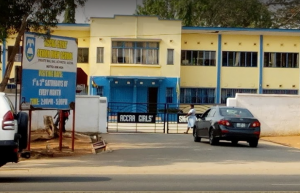The Radiological and Medical Sciences Research Institute (RAMSRI) of the Ghana Atomic Energy Commission (GAEC) has proposed to establish a laboratory for studies in human papillomavirus (HPV) and cervical cancer.
This will enhance the research capacity of Ghana towards the reduction of HPV infections and related cancers, particularly with the rising burden of cervical cancer.
The human papillomavirus is the most common sexually transmitted viral infection that can affect the genitals, mouth, or throat; while cervical cancer is a malignant tumour of the cervix, the lowermost part of the uterus.
Professor Mary Boadu, the Director of RAMSRI, in an interview with the Ghana News Agency in Accra, said the laboratory would provide the needed information to help formulate policy and estimate the potential benefits of the newly available HPV vaccines as well as for determining the best cervical and head and neck cancer screening options in Ghana.
“In doing this, the laboratory will work at building a research team for HPV and related cancer epidemiology and molecular based research, and establish collaborations with cancer related research and treatment centres both locally and internationally,” she said.
“Establishing a laboratory for HPV and related cancer research in Ghana holds significant future implication for early detection, reduction of HPV related cancer burden and the reduction of cancer death among women in particular.”
Prof Boadu said another proposed project was the establishment of radiological laboratory for tumor marker service, a centre for providing clinical and diagnostic care within a short turnaround time.
“Since tumour marker assays have now become indispensable in the management of patients with cancer, a tumour marker outfit will play a useful role in the early detection and monitoring response to treatment or disease progression”.
The institute, she said, aims to establish a national centre of excellence for cancer research, diagnosis and treatment to ensure early detection to prevent avoidable deaths.
Prof. Boadu said the successful implementation would lead to reduced cancer burden on the country and save scarce foreign exchange, which could be re-directed into other sectors of the economy for growth.
That would also position Ghana as a hub for cancer research and care in the West African sub-region, thereby promoting medical tourism in the country, and the training of scientists, physicians, nurses and other health care providers, she said.
Prof Boadu said the Institute, working with the Ghana Health Service, had done studies on tuberculosis, focusing on the types of strains, availability, and extreme drug resistance.
“With that we are able to inform policy makers on the strains available, characteristics and what kind of medication can fight them. This helps them to take the necessary intervention and timelines,” she said.
The Director of RAMSRI said an extensive research programme had also been undertaken using isotopic techniques to ascertain the effectiveness of the six months breast-feeding programme, as well as assess the level of impact and the dangers involved in the excessive intake of vitamin A supplement by children.
Giving a brief overview of another nutrition research that looked at obesity, she said the condition was becoming a big global health issue, with its accompanied problems.
“We have done some work on obesity in the Adentan Municipality and its environs to look at the causes and have suggested some intervention,” Prof Boadu said.
“The study, which was done on school children using stable isotopes techniques is expected to be expanded across the country to know the status of all children.”
She said the Institute had further proposed to conduct a toxicological risk assessment on some popular herbal products on the market to ascertain their adverse effects and ensure the health of the public.
“This work when executed would provide the state-of- the-art, high throughput genotoxicology assays regarding the safety of popular herbal products on the Ghanaian market and protect consumers from potential harmful herbal medicines,” she said.
Prof. Boadu said the RAMSRI had positioned itself to become a leading medical research institution in Ghana, employing nuclear and allied techniques to promote general human health.
Since its establishment in 2009, the Institute had contributed significantly towards employing nuclear and allied techniques to promote healthcare and development.
Some major research activities it had undertaken were nutrition, cancer biology, and diagnostic radiology studies that had helped to shape critical policies of the country.







